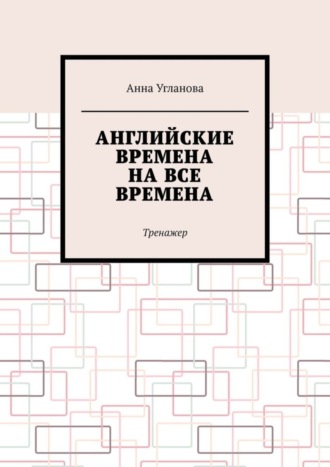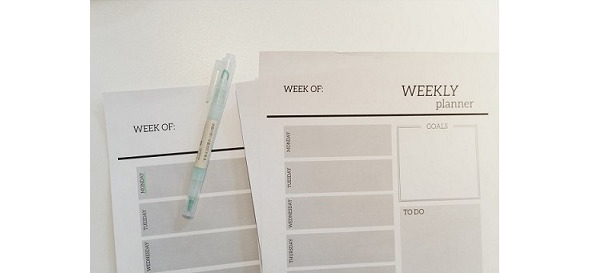
Полная версия
Английские времена на все времена. Тренажер

Английские времена на все времена
Тренажер
Анна Угланова
© Анна Угланова, 2022
ISBN 978-5-0056-6215-6
Создано в интеллектуальной издательской системе Ridero
ОТ АВТОРА
Дорогие друзья!
Приветствую вас на страницах пособия, которое наконец-то поможет вам разобраться в сложной (на первый взгляд) системе английских глагольных времен. Уверяю вас, всё гораздо проще, чем вы думаете. Вам только нужно вникнуть в суть, а остальное за вас сделает ваше образное мышление.
Пособие составлено с опорой на труды профессора П. Я. Гальперина, кандидата психологических наук, доцента Т. Б. Клементьевой, В. П. Беспалько, Гузеевой К. А., Трошко Т. Г., Virginia Evans, а также на собственные учебно-методические разработки. Благодарю всех своих учеников за прохождение данного грамматического курса на занятиях, это позволило мне систематизировать весь материал и провести анализ наиболее трудных аспектов данной темы.
Книга состоит из 3 разделов: действительный залог (Active Voice), страдательный залог (Passive Voice) и косвенная речь и согласование времен (Reported Speech and Sequence of Tenses).
В каждом разделе вы найдете таблицы, иллюстрации, упражнения и контрольные задания. Данное пособие вы можете использовать как с преподавателем, так и самостоятельно, так как упражнения имеют ключи или образцы выполнения, а после проверочных работ указаны критерии оценивания.
Желаю успеха в изучении английского языка!
Угланова Анна ОлеговнаSECTION 1
Active voice.
Активный залог
Глаголы английского языка обладают такой грамматической категорией, как залог (voice). Он показывает, само ли подлежащее производит действие или оно является объектом действия. Именно с этой целью все глаголы английского языка употребляются либо в действительном или активном залоге (active voice), либо в страдательном или пассивном залоге (passive voice).
Активный (действительный) залог показывает, что подлежащее (действующее лицо или предмет) само выполняет действие:

She’s cutting limes.
ОНА (САМА) НАРЕЗАЕТ лаймы.
Еще примеры:
They often go to the cinema.
Они часто ходят в кино.
The children showed us their pictures.
Дети показали свои рисунки.
While I was doing my homework, my grandma was knitting.
Пока я делал домашнюю работу, моя бабушка вязала.
UNIT 1
Present Simple
Present Continuous
Present Perfect Continuous
Look and compare

Моя сестра вяжет КАЖДЫЙ ДЕНЬ.
My sister knits EVERY DAY.

СЕЙЧАС 6 часов вечера. Она вяжет (СЕЙЧАС).
NOW it is 6 p.m. She is knitting (NOW).

Она вяжет свитер УЖЕ 3 ДНЯ (СО ВТОРНИКА).
She has been knitting the sweater FOR 3 DAYS
(SINCE TUESDAY).
1. Match 1—3 to a-c and complete the sentences.
1. He does his homework2. He is doing his homework3. He has been doing his homeworka. for two hours.b. every day.c. now.____________________________________________________________________________________________________________________________________________________________________________________________________________________________________________________________________________________________________________________________________________________________________________________________________________PRESENT SIMPLE

I work every day.
Present Simple (Настоящее простое) употребляется для ПОВСЕДНЕВНЫХ, РУТИННЫХ, ПОВТОРЯЮЩИХСЯ действий, для обозначения простых фактов и общих истин:
I have a shower every morning. Каждое утро я принимаю душ.Water boils at 100° C. Вода закипает при 100° C.Present Simple по форме совпадает с инфинитивом1 глагола (без частицы to) во всех лицах, кроме 3-го лица единственного числа, принимающего окончание -s (-es).

do not = don’t
does not = doesn’t
ПРАВОПИСАНИЕ окончания -s/-es у глаголов в 3 л. ед. ч.:
К большинству инфинитивов прибавляется окончание -s:
I speak – he speaksYou eat – she eatsЕсли инфинитив оканчивается на шипящие и свистящие звуки -sh, -ch, -tch, -x, -ss, -zz, а также -o, то мы добавляем окончание -es:
We watch – he watchesThey miss – she missesI go – he goesWe do – she doesЕсли инфинитив оканчивается на -y, а перед -y согласная, то -y меняется на -i + -es:
I hurry – he hurriesYou study – she studiesНО! Если перед -y гласная, то добавляем просто -s:
We pay – he paysThey enjoy – she enjoys2. Write the third singular forms of the following verbs.
I play – he ___________________I go – he ___________________I fly – he ___________________I spend – he ___________________I ask – he ___________________I wash – he ___________________I pass – he ___________________I carry – he ______________________I try – he ______________________I study – he ______________________I take – he ______________________I catch – he ______________________I do – he ______________________I teach – he ______________________FREQUENCY ADVERBS (Наречия частотности)
Present Simple часто употребляется с наречиями, выражающими частотность: always всегда, often часто, seldom редко, sometimes иногда, never никогда, usually обычно и т. д.
Они ставятся перед глаголом, НО! после глагола to be:
I usually get up at 7 o’clock but I’m never late.3. Rewrite the sentences as in the example:
I get up at 7 a.m. (always)
I always get up at 7 a.m.
1. We go to the theatre. (often)____________________________________________________________________2. They quarrel. (never)____________________________________________________________________3. He is afraid of darkness. (sometimes)____________________________________________________________________4. I come home very late. (usually)____________________________________________________________________4. Write as in the example.
I like ice cream.
Do you like ice cream?
I don’t like ice cream.
1. They live in New York.________________________________________________________________________________________________________________________________________2. You speak Russian.________________________________________________________________________________________________________________________________________3. We sleep at night.________________________________________________________________________________________________________________________________________4. He knows French very well.________________________________________________________________________________________________________________________________________5. She leaves work at 6 p.m.________________________________________________________________________________________________________________________________________5. Write the correct forms of the verbs using Present Simple.
1. The postman (to bring) ________________ us the newspapers in the morning.2. I (to hear) ____________ you well. Don’t speak so loudly.3. I (not to understand) ____________________ this sentence.4. The train (to start) _____________ at 10 o’clock.5. We (to begin) _____________ our work at 8 a.m. every day.6. The coffee beans (to grow) ____________ well in Brazil.7. Brazil (to produce) ________________ good coffee.PRESENT CONTINUOUS

She is listening to her friend.
Present Continuous (Настоящее продолженное/длительное) употребляется для выражения действий, которые происходят ИМЕННО СЕЙЧАС, В МОМЕНТ РЕЧИ (now, at the moment), иногда для выражения ближайшего будущего:
I’m watching TV (now).(Сейчас) я смотрю телевизор.We are leaving for Moscow tonight.Сегодня вечером мы уезжаем в Москву.Present Continuous состоит ИЗ ДВУХ ЧАСТЕЙ!!! —
am, is или are + глагол с окончанием -ing (причастие).
I am reading. – Я читаю (сейчас) —дословно «Я есть читающий (сейчас).»
am = ’m
is = ’s
are = ’re
am not = ’m not
is not = isn’t
are not = aren’t
Глагол to be (быть) в настоящем времени имеет 3 формы:
am употребляется только с I;
is – только с he, she, it;
are – во всех остальных случаях (т.е. во множ. числе).
6. Fill in the gaps with the verb to be.
1. It ___________________ raining today.2. The children _______________ playing in their room.3. Carrie _______________ listening to the news right now.4. I _______________ having breakfast.ПРАВОПИСАНИЕ окончания -ing:
К большинству инфинитивов прибавляется окончание -ing:
eat → eating; play → playing
Если инфинитив оканчивается на -e, то мы эту -e убираем:
move → moving; face → facing
Если в конце глагола стоит гласная + согласная и на этот слог падает ударение, то конечная согласная удваивается:
preFER → preferring; RUB → rubbing
НО!
COver → covering; reMEMber → remembering
Если в конце глагола стоит гласная + L, то пишем LL независимо от ударения:
control → controlling; travel → travelling2
ЗАПОМНИТЕ!
die → dying; lie → lying
7. Write the -ing forms.
work → _________________; write → ______________________;read → __________________; carry → _____________________;sleep → _________________; go → ________________________;leave → _________________; take → _______________________.8. Write as in the example.
I am watching TV.
Am I watching TV?
I’m not watching TV.
1. She is translating this text now.________________________________________________________________________________________________________________________________________2. You are having lunch.________________________________________________________________________________________________________________________________________3. They are listening to their director.________________________________________________________________________________________________________________________________________4. We are waiting for Helen.________________________________________________________________________________________________________________________________________5. It is raining.________________________________________________________________________________________________________________________________________9. Complete the sentences.
1. Mark and Jane (to sit) __________________________________________ in a café now.2. It (not to snow) _________________________________________________ outdoors now.3. We (to wait) ____________________________________________________ for our teacher at school.4. The girls (to argue) _____________________________________________ about what presents to buy for their Mum.5. I (to watch) _____________________________________________________ the children playing in the garden.10. Fill in with Present Simple or Present Continuous.
– Hi, Mum!– Hello, Anna. Where _____________________________________________________ (you, call) from?– I ________________________________ (be) at work at the moment. My boss _____________________________________________ (have) lunch with his wife now. He __________________________________ (often, take) her to lunch on Tuesdays.– Well, why _______________________________________________________ (you, phone)?– No, I just want you to know that I _____________________________ (come) home next Friday.– What time ______________________________________________________ (your bus, arrive)?– It ______________________ (leave) at 16.00 and ____________________ (arrive) at 17.00.– See you on Friday then.11. Underline the correct item.
1. Do you enjoy/Are you enjoying this party?2. You haven’t said a word all the evening. What are you thinking/do you think about?3. He has/is having a tabby cat.4. I don’t know/am not knowing where she keeps the money.5. Sarah is German. She is coming/comes from Germany.6. Leo listens/is listening to the music in his room.7. If you don’t read/aren’t reading that magazine, I’d like to see it.8. Chrissy weighs/is weighing 70 kilos.PRESENT PERFECT CONTINUOUS

They have been singing for an hour.
Present Perfect Continuous (Настоящее совершенное продолженное/длительное) употребляется для того, чтобы подчеркнуть, что действие началось в прошлом и продолжается в настоящем, то есть УЖЕ ДЛИТСЯ КАКОЕ-ТО ВРЕМЯ (for some time, since some time):
I’ve been waiting for you for an hour. Я жду тебя уже час.Pres. Perf. Continuous состоит ИЗ ТРЁХ ЧАСТЕЙ!
have или has + been + глагол с окончанием -ing (причастие).
I have been reading this newspaper since 2 o’clock.Я читаю эту газету с 2 часов.
have = ’ve
has = ’s
have not = haven’t
has not = hasn’t
12. Write as in the example.
I have been learning German since the 2nd grade.
Have I been learning German since the 2nd grade?
I haven’t been learning German since the 2nd grade.
1. He has been speaking English since his childhood.________________________________________________________________________________________________________________________________________2. They have been working here for several years.________________________________________________________________________________________________________________________________________3. She has been waiting for him for an hour.________________________________________________________________________________________________________________________________________4. We have been revising for exams for three days.________________________________________________________________________________________________________________________________________5.You have been living here since 1996.________________________________________________________________________________________________________________________________________
13. Complete the gaps using Present Perfect Continuous.
1. I (to run) __________________________________________ all the way.2. He (to teach) _____________________________ English since 2012.3. We (to work) ________________________________ since 10 o’clock.4. It (to rain) __________________________________ hard for an hour.5. Sue (to cook) ________________________________ dinner for us for 20 minutes.14. Choose the tense of the verb. Write S (Simple), C (Continuous) or PC (Perfect Continuous).
1. Какую музыку ты любишь слушать? _____________2. Какую музыку ты слушаешь сейчас? _____________3. Как долго ты выполняешь это задание? __________4. Ты всегда выполняешь домашние задания? ______5. Какое задание ты выполняешь сейчас? ___________15. Translate into English.
1. Я читаю сейчас. Я читаю уже 10 минут. Я читаю каждый день.____________________________________________________________________________________________________________________________________________________________________________________________________________2. Она работает 8 часов в день. Она работает сейчас (Don’t bother her!). Она работает здесь уже два года.____________________________________________________________________________________________________________________________________________________________________________________________________________3. Всегда ли он завтракает? Он завтракает сейчас. Он завтракает уже 5 минут.____________________________________________________________________________________________________________________________________________________________________________________________________________UNIT 2
Questions
(Present Simple/ Present Continuous/
Present Perfect Continuous)
PRESENT SIMPLE – QUESTIONS
Questions with the verb TO BE
AM/IS/ARE + ☺?
SPECIAL QUESTION WORD + AM/IS/ARE + ☺?
16. Look at the example and write the questions.
I am at the zoo. Are you at the zoo? Where are you?
1. The children are at home.Are _______________________________________________________________?Where ____________________________________________________________?2. It is a great idea.Is _________________________________________________________________?What idea ________________________________________________________?3. We are happy to see you.__________________ you ____________________________________________?Who (m) _________________________________________________________?General questions
Общие вопросы. Требуют ответов «да» или «нет».
DO/DOES + ☺ + V?
17. Look at the example and write the questions.
We study English. Do you study English?
1. He goes to work every morning.___________________________________________________________________?2. She reads a lot.___________________________________________________________________?3. They often wait for him.___________________________________________________________________?Special questions
Специальные вопросы.
Начинаются со специальных вопросительных слов
(Где? Куда? Когда? Почему? и т.д.).
QUESTION WORD + DO/DOES + ☺ + V?
18. Look at the example and write the questions.
We study English twice a week. How often do you study English?
1. He goes to work every day.Where ____________________________________________________________?2. She reads books and magazines.What _____________________________________________________________?3. They often wait for him.Who __________________________________________________________ for?Alternative questions
Альтернативные вопросы с or.
DO/DOES + ☺ + V or V?
DO/DOES + ☺ or ☺ + V?
19. Look at the example and write the questions.
We study English twice a week.
Do you study English or French?
1. He goes to work by bus.___________________________________________________________________?2. She reads books.___________________________________________________________________?3. They often wait for their friend.___________________________________________________________________?Disjunctive questions
Разделительные вопросы с «хвостиком – не так ли?»
☺ + V/V-s, don’t/doesn’t + ☺ (personal pronoun)?
☺ + don’t/doesn’t + V, do/does + ☺ (pers. pron.)?
20. Look at the example and write the questions.
We study English.
We study English, don’t we?
1. He goes to work every day.___________________________________________________________________?2. Karen doesn’t read a lot.___________________________________________________________________?3. They often wait for her.___________________________________________________________________?21. Translate into English.
1. Часто ли вы ждёте своих друзей?____________________________________________________________________2. Что ты обычно делаешь вечером?____________________________________________________________________3. Где вы учитесь?____________________________________________________________________4. Где вы живёте?____________________________________________________________________5. Откуда вы родом?____________________________________________________________________6. Куда вы ходите по воскресеньям?____________________________________________________________________7. Как часто вы ходите на концерты?____________________________________________________________________8. Любите ли вы классическую музыку?____________________________________________________________________9. Какую музыку вы любите?____________________________________________________________________10. Какие фильмы вы любите больше всего?____________________________________________________________________PRESENT CONTINUOUS – QUESTIONS
General questions
Общие вопросы. Требуют ответов «да» или «нет».
AM/IS/ARE + ☺ + V-ing?
22. Look at the example and write the questions.
We are having an English class. Are you having an English class?

